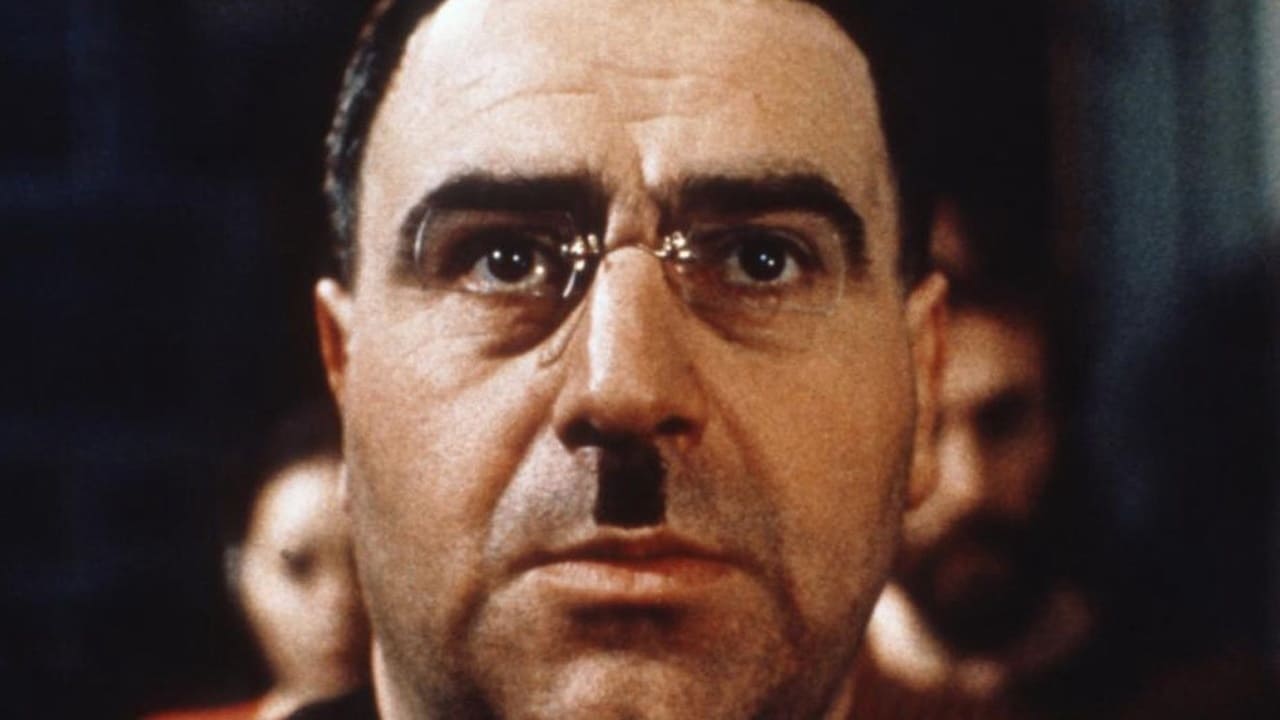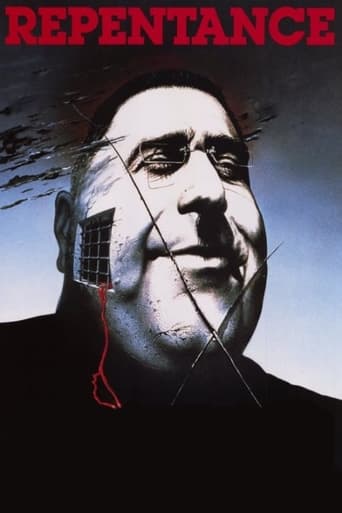Fairaher
The film makes a home in your brain and the only cure is to see it again.
Hattie
I didn’t really have many expectations going into the movie (good or bad), but I actually really enjoyed it. I really liked the characters and the banter between them.
Philippa
All of these films share one commonality, that being a kind of emotional center that humanizes a cast of monsters.
Teyss
"Repentance" is part of a trilogy produced on the long term, together with "The Plea" (1968) and "The Wishing Tree" (1977). Nonetheless, it can be watched as stand-alone. Its originality, outstanding aesthetics and compelling themes constitute a landmark in former USSR cinema, as well as worldwide. It is a fascinating metaphor on power, tyranny and ideology. *** WARNING: CONTAINS SPOILERS ***The structure of the movie is as of "Russian puppets" (this comparison is of pure form, since it is Georgian): stories are imbricated in one another. There are six sequences, organised on four different levels.1. PRESENT. A woman, Ketevan, and a man learn the death of Varlam.2. IMAGINATION. (We first think it is a continuation of present action. The true nature of this sequence will only be revealed at the end.) Ketevan imagines she unearths Varlam's body and faces trial.3. PAST. Ketevan during the trial describes how her childhood and family were destroyed by Varlam. It is hence an "imagined flashback" since it is included in part 2.4. FANTASY. Four scenes are included in parts 3 and 5: Nino dreams (she and Sandro try to escape Varlam), Abel daydreams (he talks to a devilish character who is actually Varlam), Merab fantasises twice (he sees Varlam is crazy, Guliko dances near Varlam's body).5. IMAGINATION (same level as 2). We come back to the trial.6. PRESENT (same level as 1). We understand parts 2 to 5 were imagined by Ketevan.This "Russian puppets" structure generates a sensation of confinement, on line with the environment: the story is limited to a town without any news from outside; time seems suspended although the action takes place over decades; we are lost in a indefinite period between modernity and Middle Ages (the horse carriage, the medieval armours). The confinement materialises an allegory: the focus is on symbols, not proportions nor accuracy.Another trademark of the movie is its unique mix of reality and fantasy. For instance, Abel daydreams he sees Varlam eating a fish: when he comes to, his hands actually grasp fish bones. When Merab imagines Varlam is crazy, the scene seems real, and is probably based on actual facts: Varlam was somewhat lunatic, a feature that might have worsened with age. Conversely, many supposedly "authentic" scenes feel unreal. When Sandro comes back, he meets a man in suit and a blindfolded woman (Justice) playing piano outside. When Nino and her young daughter Ketevan look for Sandro's name on logs, the atmosphere is dreamlike or, rather, nightmarish: outstanding images, pace and music make this scene one of the most compelling of the movie, and of cinema in general.The confusion between reality and fantasy even casts doubt on the movie's structure and credibility. Did Ketevan imagine all this, or only partly? What is true or not? Metaphorically, this incertitude illustrates the absurdity of tyranny: everything is irrational. Power is unpredictable: Varlam is grotesque but omnipotent; he suddenly changes from sympathy to repression; stupid accomplices become powerful. Nobody is safe: rules are arbitrary; people can be arrested or released randomly; a centuries-old temple is destroyed for no reason; opponents confess stupid acts (digging a tunnel between London and Bombay) and denounce everybody to weaken the system. Power transits from one generation to another unchanged (the same actor plays Varlam and his son Abel)… until it destroys itself: Merab, unable to embrace the system or change it, commits suicide; Abel eventually unearths Varlam and throws him to the crows, exactly as Ketevan said she wanted to.To carry on, despotism will use reasons that look logical but are arbitrary: scientific "progress" overriding everything else (the experiments endangering the temple), a minority presented as "the people" (the letter denouncing Sandro), external threats (repeated a few times), necessity of hardships that will bring better tomorrows (on the glorious music of "Ode to Joy"), senseless quotes celebrated as Gospel ("We will catch the black cat in the dark room, even if there is no cat"). The references to USSR regime are obvious. However, "Repentance" also delivers a general message about dictatorship: Varlam looks at the same time like Beria (glasses), Hitler (moustache) and Mussolini (black shirt, braces). Deep down, all tyrannies rely on irrationality that pretends to be rational.On top of power, "Repentance" is a reflection about ideology. Varlam is cultured: he knows about painting and religious art, he sings, recites Shakespeare, quotes Confucius. So is his son Abel, who plays the piano. Yet knowledge is nothing, and even dangerous, if it is used for wrong reasons. Culture turns against itself: Sandro's paintings are confiscated; the artist Sandro is deported; the temple is destroyed; Varlam promotes precisely what Shakespeare's sonnet criticised. To save the world, we do not need brains but a heart.A heart, granted, but how? Crushed by oppression, people are powerless. Ketevan, whose family was destroyed by Varlam, now feeds a ridiculous little man who supports the dictator; she can only imagine what she could do. Varlam's grandson commits suicide. Opponents collaborate and/or are deported. People fantasise to escape reality.Nevertheless, for a heart and to escape oppression, one can turn to religion. As a reminder, religion was heavily repressed in USSR. Allusions to this repression include: the man at the beginning eats cakes shaped as churches; Varlam in Abel's dream eats a fish (reference to Christ: ICTUS); the temple crumbles and is finally destroyed. Yet as a sign of hope, the movie closes on the wise words of an old lady: "What good is a road if it doesn't lead to a temple?" Spirituality will carry on regardless.In the end, what is the "Repentance" of the title? Merab's who realises how evil his grandfather was? Abel's who throws away Varlam's body? Ketevan's who regrets being unable to perform her imagined revenge? Others' lack of repentance? As the movie, the title encloses different levels of interpretation and remains partly mysterious.
MartinHafer
After the death of Stalin, folks in the Soviet Union were allowed to express their feelings towards his reign of terror...at least to a point. However, the government also was concerned that these complaints might lead to complaints about the current system--and this is probably why "Repentance" was banned for several years after it was filmed. It does attack the Stalinist era and mentality--but apparently those in power at the time weren't willing to allow such a film to be released."Repentance" is a very surreal sort of film--one which has many story elements that seem dreamy and unreal while the rest of it is quite literal. While there were purges, seeing the 20th century purges carried out by knights in armor, a living statue of Justice and many other story elements are dream-like and strange. This is not really a complaint--just an observation. The film looks almost like Dalí or Buñuel added a few touches here and there...just a few.The story begins in the present day. The beloved mayor of a Georgian town, Varlem, has died and folks come to his funeral to pay their respects. However, several times after the funeral, the body of this man has been taken from the crypt and placed in his yard! After the third time, they catch the woman responsible and she is taken into custody. At the hearing, she openly admits having done it and tells a story of long ago--when Varlem first became mayor. At that time, he made a name for himself persecuting the innocent--and the story is about how this impacted the woman personally.Following her long tale, the story goes to the present day. The hypocrisy and evil of Valem's friends are examined as well--including one case about a man who struggles between Atheism and Christianity. Under Christianity, he SHOULD feel guilt--and he ultimately gets to meet the Devil (this is pretty weird...and clever). Other folks all begin to confront their own part in Varlem's reign of terror.Instead of this film directly attacking Stalinism, it clearly attacks these tactics on a smaller scale. And, I am sure it was not unintentional that Varlem looked much like a bloated Hitler! A very strange but daring film. While today it might be seen as very tame, back in the mid-1980s it must have caused the filmmakers a lot of problems--and potentially prison. Quite clever but quite slow and strange. Well worth seeing--especially if you lived through this era.
sanni-seven
For me, that's what a true movie should do: make you think, discuss what you saw with others and, as importantly, with yourself... So many incredible scenes... So many questions, for which you should find an answer suitable for yourself... Many things seem ingénues and at the same time a little absurd: the medieval guard in the middle of the 20th century, the Barateli court scene, the deadman being dug from his grave... makharadze plays in a way that makes you sit open-mouthed... the scene of killing the sun is a masterpiece, as well as the scene of Abel on a confession... simply brilliant...The character of Varlam Aravidze is also an incredible creation of both Makharadze and Abuladze: can you imagine Beria, Stalin and Hitler fused in one person? well, you get this person here, and the horror is that this person looks just like you and me, not a monster everyone sees drawn in their fantasies...Quotes, dialogues and phrases take special place in this film... By listening to how Varlam talks, how he addresses people, you get a template of how a person can become a tyrant, dictator... "We will catch the black cat in a dark room, even if this cat is not in the room"and, of course the question of the century: "is it worth to kill millions to save hundreds of millions?" publicly everyone will say "no, it's not"... but in reality...I'll finish with one of the main things said in the movie, one of the reasons this film is a masterpiece: "will this road lead me to the temple?"...."why do i need a road that does not lead to the temple?" these are the questions of the 20th century as well... you decide what a "temple" is and whether or not we are on the proper road...this film truly deserves all the praise it got from the world community...
Ivane
The action takes place in the USSR province of Georgia, today. Varlam Aravidze's funeral has been a very solemn ceremony. And yet, the very next day, his body is dug up and dumped into his son Avel's garden. Buried once again, the body is once again unearthed, as if this man's corpse was destined not to rest in peace. The culprit is soon found. Ketevan Barateli is dragged to court where a long flash-back shows us the persecutions her family had to endure under the dictator. He persecuted her father, her mother, who have since both disappeared and then Ketevan herself, with a cruelty sadistic and pervert.The trial brings to light the truth about a man who was but the mayor of a small town but whose personality and behaviour bring to mind both Mussolini and Hitler, as well as Stalin and Beria.Varlams Grandson commits suicide when he discovers the truth about his grandfather and denial of everything by his father.And still the dictator's corpse cannot rest in peace...Varlam & Avel Aravidze is played by Avtandil Makharadze. Brilliant performance - one of the best dictator faces ever done.

